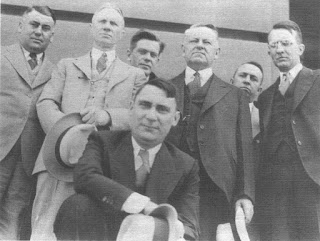 I became re-inspired to try when someone came to me and optioned it for a year for the purpose of making a movie or limited series. When he couldn't get it made, I decided to give it another try. So I wrote my own version of a limited series pilot along with a series Bible. There were some interesting things to note about the translation from written work to screenplay.
I became re-inspired to try when someone came to me and optioned it for a year for the purpose of making a movie or limited series. When he couldn't get it made, I decided to give it another try. So I wrote my own version of a limited series pilot along with a series Bible. There were some interesting things to note about the translation from written work to screenplay.First, I had to let go of the inner historian; at least a large part of him. It's not that I was willing to give up all historical accuracy, but I had to put the emotion of the story first. In fact,t hat leads to the second, and most important task in translating a book to a screenplay.
The emotion of what happened and why it's relevant to the audience has to come first. It's important to note that this does not run counter to historical accuracy. In fact, it should run in tandem with it. A common misconception is that entertainment value and historical accuracy are at odds with one another. Some will say you need to drop historical accuracy for entertainment, others say you have to sacrifice entertainment in favor of accuracy, while others will say you need to balance the two.
All three of those are the wrong point of view to take. If a filmmaker likes a true story well enough that they want to make it into a film, there must be something that drew them to the story in the first place. Why make a movie about something for which there is no attraction? What needs to happen is to translate it from written word to screen in the same way one translates from one language to another. The words don't translate exactly, so you have to take the meaning of the sentence in one language and reword it in a sentence of the other language. In no way would a good translator throw out the meaning of the original sentence.
With that in mind, one needs to look at the structure of a historical book, and the structure of a screenplay. A historical book tells about the background of the characters involved, what brought them to the present, and dwells on individual moments to give details about each one. A book can also jump around in time to give information about a person or a place. A film is much more linear, and the story needs to keep moving with no time to stop and dwell on anything. Yet we still want to know more about the characters so we care about them. So it's important to find ways to slip in information about them as it's going along through organic actions we see on screen.
As an example of how I did this in The Great Heist, when I introduced Max Towle I combined several times he was in a courtroom performing his wild antics. These incidents had taken place over many years, some of which happened after the incidents in the story. But we're not going to jump through all those time periods and the audience needs to know in a couple minutes what this guy is all about. So, those elements get combined.
As I wrote the script, I kept the book open, writing what was happening, but then translating it to the language of film; combining events or altering them to give the emotional impression of what happened rather than trying to portray the exact thing.
I recently saw this in a movie called The Death of Stalin. The events of the story are very accurate, but many of the specifics are exaggerated to emphasize the absurdity of what occurred. A story about decades of tragedy is thus transformed into an absurdist comedy while the historical accuracy of it all is kept intact.
